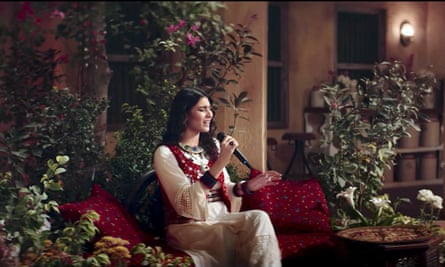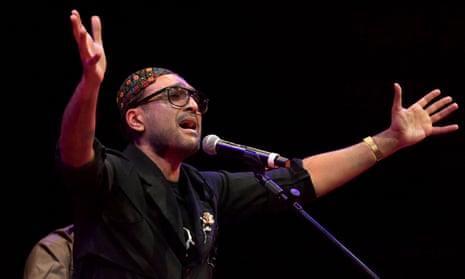From radio stations in Islamabad to the nightclubs of Delhi and house parties in Kathmandu, it is a song that in recent months has been impossible to avoid. As soon as the distinctive opening claps of Pasoori, by the Pakistani singer Ali Sethi and his collaborator Shae Gill, are heard, it is often greeted with a roar of approval.
And it is not just in south Asia: since it was released in February, the song, which draws on traditional and modern musical influences, has gone on to become a global phenomenon and one of Pakistan’s most popular musical exports for years. It has more than 111m views on YouTube, it was the first Pakistani song to top Spotify’s global viral charts, and the first Pakistani song to enter its official global songs chart.
Sethi, a classically trained musician as well as a singer, composer and fiction author, has grown to be one of Pakistan’s most popular pop stars, though having lived in the US for the past five years he has said he sees himself more as a “diasporic voice”.
The song has been heralded for transcending boundaries, particularly between India and Pakistan, continuing a long tradition of culture uniting the two countries where politics always failed. In India, Pakistani soaps are among the most popular television shows, while people in Pakistan avidly consume Bollywood films and music.
Pasoori, which roughly translates as “difficulty”, came from Sethi’s encounters with the often unsurmountable walls that exist between India and Pakistan, which stopped him from being able to visit and perform in India. The lyrics draw on the age-old story of forbidden love, and are written in Punjabi, a language spoken in both India and Pakistan.
“It’s been a theme running in my life for several years; I’ve had to engage with my Indian fans and friends through veils, lest we draw the attention of extremist elements whose job is to maintain the rigid boundary between India and Pakistan,” Sethi said. “So I’d been mulling the theme of prohibition for many months.”
He emphasised that the classical and folk traditions on which the song draws, including the Sufi traditions of Qawwali music, had come about long before partition and so could not be codified as either Indian or Pakistani, and had centuries-long roots on both sides of the border.
He said he had wanted to write a song that “felt classical but also relevant to contemporary life”, but admitted he had no idea it would become so popular across the region.

The song has also become a victim of its own success. Many have pointed out that Sethi’s privilege – he is from an elite, educated family in Lahore, was educated at Harvard and now lives in New York – has given him and his music a platform not afforded to many other Pakistan artists.
Rafay Mahmood, a writer on south Asian music, said: “We have a number of very well-versed, young and trained classical singers but they can’t access the Gen Z marker which Ali can do, due to their lack of cosmopolitan exposure and in some cases education.”
However, Mahmood said the song was to be celebrated for Sethi “finding his own voice” and for successfully weaving in traditional south Asian musical motifs with popular electronic dance beats.
“Pakistani songs have travelled across the border and it is not the first time,” he added. “Pasoori is not a statement or a political anthem. It is a well-produced, catchy song. Nothing else, nothing more.”
Pasoori was released through Coke Studios, an influential Pakistani television programme and musical franchise, which since 2008 has invited some of the country’s most popular and respected musicians to write tracks and perform them live. The songs that have come out of Coke Studios are consumed as much by Indian listeners as Pakistani, and the franchise has played a crucial role in bringing Pakistani music to international audiences. Sethi has performed on five Coke Studios series since 2015, and Pasoori is his biggest hit from it yet.
Zulfiqar Jabbar Khan, known as Xulfi, the producer and curator of this recent season of Coke Studio, said the moment he had heard Pasoori “I felt the excitement rushing through me. I told him [Sethi] that when people will listen to this, they won’t know what hit them and that this song has the capability to go global.”
Xulfi said the popularity of Pasoori had “opened the global door of love” towards Pakistani pop music and “the opportunity to frequent the charts has opened up too”.
“In all honesty, I am very excited for the future because I know Pakistan has the ability to surprise the world,” he said. “And to make sure we keep doing that, we need to keep conveying our progressive and artistic side to the world.”
